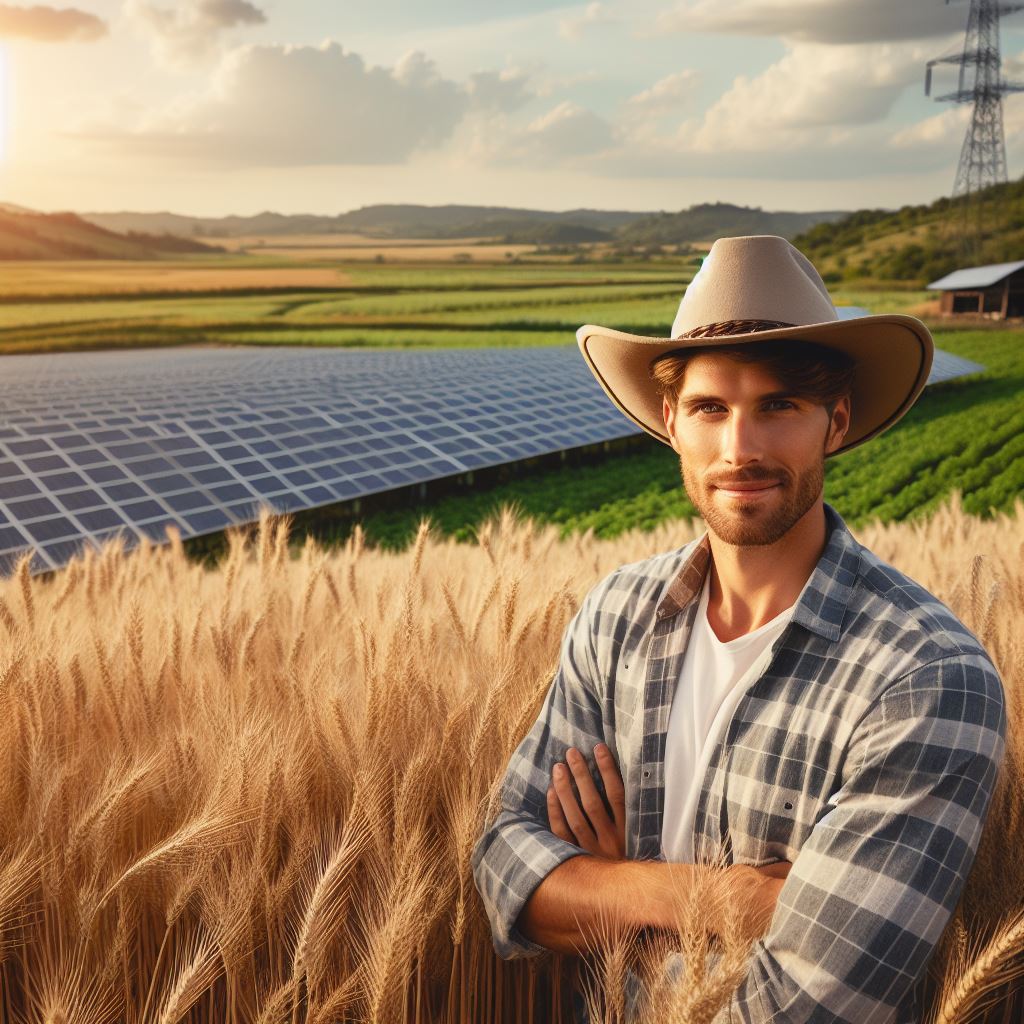Introduction
Solar energy is revolutionizing agriculture, providing modern farms with sustainable and efficient solutions.
By harnessing the power of the sun, farmers can reap a multitude of benefits.
Solar technology offers a way to reduce operating costs, increase energy independence, and minimize environmental impact.
In recent years, the use of solar energy in agriculture has gained traction, and for good reason.
Farmers are beginning to understand the immense potential and advantages this renewable resource can bring to their operations.
Solar solutions have the ability to transform modern farms into self-sustainable, eco-friendly entities.
The importance of utilizing solar energy in agriculture cannot be overstated.
Unlike traditional energy sources, solar energy is freely available and abundant. Farms have the advantage of vast open spaces that can be utilized to harness the sun’s power.
By installing solar panels and systems, farms can generate their own electricity, decreasing reliance on the grid and lowering operating costs in the long run.
Furthermore, solar energy is a clean and green alternative to fossil fuels.
By choosing solar solutions, farmers can significantly reduce their carbon footprint, contributing to a healthier environment.
This clean energy source produces zero greenhouse gas emissions, mitigating climate change and preserving the planet for future generations.
In addition to the environmental benefits, solar power also offers financial advantages. With the installation of solar panels, farms can save substantial amounts on their electricity bills.
Excess energy can even be sold back to the grid, turning the farm into a small-scale power plant and providing an additional source of income.
Going solar is a win-win situation for modern farms. By harnessing the power of the sun, farmers can reduce operating costs, increase energy independence, and contribute to a more sustainable future.
Transform Your Agribusiness
Unlock your farm's potential with expert advice tailored to your needs. Get actionable steps that drive real results.
Get StartedIn the following sections, we will explore various solar solutions that can be implemented on farms to maximize these benefits.
Why Solar Energy is Beneficial for Modern Farms
Using solar power in modern farms has numerous environmental advantages.
Solar energy can help reduce carbon footprint and greenhouse gas emissions in agriculture.
Additionally, it offers potential cost savings for farmers.
A. Environment Benefits of Solar Power in Farming
- Solar energy is a clean and renewable source, unlike conventional energy sources like fossil fuels.
- Using solar power reduces dependence on non-renewable energy and contributes to overall sustainability.
- Widespread adoption of solar energy in farming can significantly reduce air pollution and improve air quality.
- Unlike traditional energy sources, solar energy does not release harmful emissions or pollutants, protecting soil and water quality.
- Solar power helps preserve natural resources by reducing the reliance on traditional energy sources.
B. Reducing Carbon Footprint and Greenhouse Gas Emissions
Utilizing solar energy in farming can have a significant positive impact on reducing carbon footprint and greenhouse gas emissions.
- Solar power produces zero emissions during operation, helping farms achieve carbon neutrality.
- By replacing conventional energy sources with solar energy, farms can minimize their overall emissions.
- The reduction in greenhouse gas emissions supports efforts to combat climate change and its detrimental effects on agriculture.
C. Potential Cost Savings in Agriculture
Solar energy offers potential cost savings for modern farms, which can be advantageous for both small-scale and large-scale agricultural operations.
- Farms can generate their own electricity through solar panels, reducing the need to purchase energy from the grid.
- By incorporating solar power, farmers can lower their operational costs in the long run.
- Solar power systems have a long lifespan and require minimal maintenance, resulting in reduced expenses.
- Government incentives and grants for solar energy adoption can further enhance the cost savings for farmers.
- By investing in solar energy, farmers can hedge against rising electricity costs in the future.
In short, solar energy provides numerous environmental benefits for modern farms.
It helps reduce carbon footprint and greenhouse gas emissions while offering potential cost savings for farmers.
By harnessing the power of the sun, agriculture can become more sustainable, efficient, and resilient.
Read: Biomass Energy: Farming’s New Ally
Types of Solar Solutions for Farms
Solar solutions have become increasingly popular for modern farms due to their numerous benefits.
From reducing environmental impact to cutting down costs, solar solutions are transforming the agricultural industry.
A. The various solar solutions available for modern farms
Let’s explore the various types of solar solutions available for farms:
1. Solar panels
Solar panels are perhaps the most common and widely used solar solution for farms.
They harness sunlight and convert it into electricity, which can be used for powering lighting systems, machinery, and other farm operations.
The benefits of using solar panels include:
- Lowering energy costs: By generating electricity on-site, farmers can significantly reduce their reliance on traditional energy sources and save money on their energy bills.
- Improving sustainability: Solar panels produce clean and renewable energy, reducing carbon emissions and minimizing the farm’s environmental impact.
- Enhancing energy independence: With their own solar panels, farmers become less dependent on the grid, ensuring a stable and uninterrupted energy supply.
2. Solar water pumps
Water is a crucial resource for any farm, and solar water pumps are an effective solution for irrigation and livestock watering.
These pumps operate using electricity generated by solar panels and offer several advantages:
- Cost savings: Solar water pumps eliminate the need for fuel or electricity from the grid, resulting in significant cost savings over time.
- Easy installation and maintenance: These pumps are simple to install and require minimal maintenance, reducing operational hassles for farmers.
- Reliability: Solar water pumps can operate in remote areas without access to electricity, providing a reliable water source for agricultural activities.
3. Solar-powered fencing
Protecting crops and livestock from predators is a common challenge for farmers.
Solar-powered electric fences offer a sustainable solution, benefitting farms in the following ways:
- Cost-effective: Solar-powered electric fences eliminate the need for traditional energy sources, reducing operational costs for farmers.
- Flexibility: These fences can be easily installed and moved, allowing farmers to adapt their fencing needs as per their livestock rotation plans.
- Environmentally friendly: Solar-powered electric fences run on renewable energy, reducing the farm’s carbon footprint and environmental impact.
B. Examples of successful implementations
- Vermont Vegetable Farm installed a solar panel system that covered 70% of the energy needs for their dairy operations. This resulted in a cost reduction of 30% and a significant decrease in their carbon emissions.
- Nebraska Corn Farm implemented solar water pumps for irrigation. This not only reduced their water costs but also increased crop yields by providing a consistent water supply during dry seasons.
- Arizona Fruit Orchard installed solar-powered electric fences, significantly reducing their labor and maintenance costs while effectively protecting their livestock.
In essence, solar solutions offer a range of benefits for modern farms.
From solar panels to solar water pumps and solar-powered electric fences, these solutions help farmers save costs, reduce their environmental impact, and improve operational efficiency.
With the examples of successful implementations, it’s evident that solar solutions have the potential to revolutionize farm operations and contribute to a sustainable agricultural industry.
Read: Agriculture’s Wind Power Transformation
Showcase Your Farming Business
Publish your professional farming services profile on our blog for a one-time fee of $200 and reach a dedicated audience of farmers and agribusiness owners.
Publish Your ProfileOvercoming Challenges in Adopting solar solutions
As farmers consider implementing solar solutions for their modern farms, they may encounter various challenges.
However, with the right strategies and resources, these obstacles can be overcome to ensure a successful transition.
A. Potential challenges farmers may face
- Lack of initial funding: The high upfront costs of solar installations can pose a financial challenge for farmers.
- Technical knowledge and expertise: Farmers may lack the required technical know-how to install and maintain solar systems.
- Space limitations: Limited land availability can make it challenging to install an adequate number of solar panels.
- Intermittency of solar power: Dependence on sunlight may create concerns about consistent energy supply during cloudy or winter periods.
- Regulatory hurdles: Navigating through complex permitting and regulatory processes can be time-consuming and frustrating.
B. Overcoming the challenges
Despite these challenges, there are various ways farmers can overcome them and reap the benefits of solar solutions.
1. Funding options
Farmers can explore financing options tailored to their needs, such as solar loans, leases, or power purchase agreements.
These options help mitigate the initial financial burden by spreading out the costs over time.
2. Government incentives
Many governments provide incentives, grants, and tax credits for renewable energy projects, including solar installations.
Farmers can research these programs and take advantage of the financial support they offer.
3. Collaborative approach
Farmers can consider forming cooperatives or partnerships with neighboring farms to share the costs and benefits of solar installations.
Collaborative efforts can make solar solutions more affordable and feasible for everyone involved.
4. Technical assistance and training
Farmers can seek assistance from solar experts and organizations specializing in agricultural solar solutions.
These experts can provide guidance on system design, installation, and maintenance, helping farmers overcome technical challenges.
5. Energy storage solutions
To address concerns about solar intermittency, farmers can invest in energy storage technologies such as batteries.
These systems store excess solar energy during sunny periods for use during low-light conditions, ensuring a more reliable energy supply.
C. Advice and resources for farmers
To navigate the adoption process effectively, farmers can consider the following advice and utilize available resources:
1. Research and planning
Prioritize thorough research and planning to understand the benefits, costs, and requirements of solar solutions specific to your farm.
Consider factors like energy consumption patterns, space availability, and potential savings.
2. Engage with experts and experienced farmers
Connect with agricultural solar experts and farmers who have already adopted solar solutions.
Their experiences and insights can provide valuable guidance and help avoid common pitfalls.
3. Stay updated on incentives and policies
Regularly check for updates on government incentives, grants, and policies to take full advantage of available financial support.
Subscribe to relevant newsletters or join renewable energy associations for timely information.
4. Collaborate and share knowledge
Collaborate with other farmers in your community who are interested in solar solutions.
Share knowledge, experiences, and resources to collectively overcome challenges and accelerate the adoption process.
5. Consider long-term benefits
While the initial investment may seem significant, consider the long-term benefits solar solutions offer, such as reduced energy costs, increased energy independence, and positive environmental impacts.
By proactively addressing the potential challenges and leveraging available resources, farmers can successfully adopt solar solutions and enhance the sustainability of their modern farms.
Read: Sustainable Farming with Solar Panels

Case Studies on Successful Solar-Powered Farms
In this section, we will explore real-life examples of farms that have successfully implemented solar solutions.
These case studies will provide insights into the experiences, benefits, lessons learned, and best practices that other farmers can adopt.
A. Real-life examples of farms that have successfully implemented solar solutions
1. Green Acres Farm
Green Acres Farm, located in the heartland of Illinois, has been powering its operations with solar energy since 2012.
By installing a solar array on their barn roof, they have reduced their dependence on traditional energy sources and cut down on their carbon footprint.
The farm has experienced numerous benefits from solar power, including significantly reduced energy bills, increased self-reliance, and improved sustainability practices.
The excess energy produced by the solar panels is fed back into the grid, allowing the farm to earn credits and further reduce costs.
One of the key lessons learned by Green Acres Farm is the importance of proper planning and sizing of the solar system.
By conducting a thorough energy audit and working closely with a reputable solar provider, they were able to design a system that meets their current and future energy needs.
Best practice: Before investing in solar, conduct an energy audit and work with a trusted solar provider to properly size your system.
2. Sunflower Ranch
Sunflower Ranch, located in California’s fertile Central Valley, has become a leader in sustainable agriculture by harnessing the power of the sun.
They have installed solar panels across their vast fields, providing not only power but also shade for their crops.
The solar-powered irrigation system at Sunflower Ranch has dramatically reduced water usage and increased crop yields.
The farm has also reduced its reliance on diesel generators, resulting in cleaner air and a healthier environment for both workers and nearby communities.
Aside from the direct benefits, Sunflower Ranch has also experienced positive financial impacts.
Through various solar incentives and tax credits, they have recouped a significant portion of their initial investment in a relatively short period.
Showcase Your Farming Business
Publish your professional farming services profile on our blog for a one-time fee of $200 and reach a dedicated audience of farmers and agribusiness owners.
Publish Your ProfileLesson learned: Solar solutions can provide dual benefits of power supply and shade, positively impacting both energy consumption and crop productivity.
3. Prairie View Dairy
Prairie View Dairy, a family-owned farm in Wisconsin, has successfully integrated solar solutions to power their dairy operations.
Their solar system not only meets the farm’s electricity needs but also supplies power to the cooling systems for their cows.
By reducing their reliance on fossil fuels, Prairie View Dairy has significantly reduced their operational costs and carbon emissions.
The farm has also embraced energy-efficient practices, such as LED lighting and high-efficiency equipment, further optimizing their energy consumption.
The success of Prairie View Dairy’s solar project has inspired neighboring farms to explore solar solutions.
By openly sharing their experiences and collaborating with other farmers, they have fostered a culture of sustainability in their community.
Best practice: Embrace energy-efficient practices alongside solar solutions to maximize the benefits and further reduce operational costs.
These case studies illustrate the transformative power of solar solutions in modern farming.
The experiences of Green Acres Farm, Sunflower Ranch, and Prairie View Dairy serve as valuable examples for farmers looking to adopt sustainable practices and harness the potential of solar energy.
By learning from their successes and challenges, farmers can pave the way for a greener future and contribute to the long-term sustainability of agriculture.
Read: Farms Go Green: Wind Energy’s Role
Tips for Farmers Considering Solar Solutions
Are you a farmer interested in adopting solar energy on your farm?
Here are some practical tips and advice to consider:
Practical tips and advice for farmers interested in adopting solar energy on their farms
- Assess your energy needs: Before installing solar panels, evaluate your farm’s energy demands to determine the size of the solar system you’ll need.
- Consider your location: Research the local climate and sunlight exposure in your area to ensure that solar energy is a viable option.
- Understand farm size: Larger farms may have more space for solar panels, while smaller farms may need to maximize efficiency with smaller systems.
- Analyze your budget: Determine your financial capabilities and consider the long-term benefits of solar energy for your farm.
- Explore available incentives: Look for government incentives, grants, or tax credits that can help offset the cost of installing solar panels.
- Seek reputable suppliers/installers: Research and choose a trusted solar panel supplier/installer with experience in agricultural applications.
- Ask for referrals: Seek recommendations from other farmers who have already installed solar panels on their farms.
- Conduct a feasibility analysis: Assess the potential solar energy output, taking into account factors like shading, orientation, and panel tilt.
- Consider on-site energy storage: Explore the possibility of installing battery storage systems to store excess solar energy for use during periods of low sunlight.
- Implement energy-efficient practices: Prioritize energy efficiency by investing in energy-saving equipment and implementing sustainable farming practices.
- Monitor system performance: Regularly monitor your solar system’s performance to identify any issues and optimize its energy production.
- Maintain the system: Keep your solar panels clean and in good condition to ensure optimal efficiency and longevity.
- Stay informed: Continuously educate yourself on the latest advancements in solar technology and farming practices.
- Engage with the farming community: Join farmer associations or forums to share experiences and learn from others who have already adopted solar solutions.
- Be patient: Understand that solar energy is a long-term investment and it may take time to see a return on your investment.
By considering these factors and following the tips above, farmers can make informed decisions about adopting solar solutions on their modern farms.
Solar energy can provide sustainable, cost-effective, and environmentally-friendly power, contributing to a greener future for agriculture.
Conclusion
Solar solutions are crucial for modern farms, offering numerous benefits.
By harnessing solar energy, farmers can reduce their reliance on traditional sources and lower their energy costs.
Solar power also helps in reducing carbon emissions and mitigating climate change.
It is important for farmers to explore the potential of solar energy in their operations.
By investing in solar solutions, they can enhance their sustainability practices and contribute to a greener future.
Solar panels can be installed on rooftops, barns, or unused land, making it a flexible option for farms of all sizes.
To take advantage of solar energy, farmers can reach out to experts in the field who can provide guidance on system design, installation, and maintenance.
These professionals can evaluate the specific needs and conditions of each farm and provide tailored recommendations.
Additionally, farmers can access additional resources such as government grants or incentives that support the adoption of solar solutions.
These resources can help offset the initial investment costs and make the transition to solar energy more financially viable.
Solar solutions offer immense benefits to modern farms. From cost savings to environmental impact reduction, solar energy is a sustainable choice.
So, take action today and embrace solar solutions for a brighter and greener future in agriculture.
Contact experts and explore the opportunities available for your farm. Together, we can cultivate a sustainable future powered by the sun.




